NLIS 4
May 16, 2005
(Government Services)
The following is being distributed
at the request of the Petroleum Pricing Office:
All regulated fuel
prices see declines effective May 15
Effective 12:01 a.m., May 15, there
will be a reduction in the maximum prices of all fuels regulated by
the Public Utilities Board�s Petroleum Pricing Office (PPO) in
Newfoundland and Labrador, except in regions currently under a price
freeze.
The PPO will lower maximum gasoline prices by 1.1 cents per litre (cpl);
diesel by 1.0 or 1.1 cpl (depending on the rounding-off effect for a
particular pricing zone); stove oil by 2.45 cpl; and, residential
propane used for home heating purposes by 2.0 cpl.
In accordance with policy established in March 2003, the additional
cost of blending jet fuel with No. 2 furnace oil (see Backgrounder),
which has been in effect since Nov. 15, 2004, will be removed at
this time. This results in an overall decrease in the price of
furnace oil by 3.54 cpl.
David Toms, PPO director (acting), said the NYMEX (New York
Mercantile Exchange) commodities market has seen several pricing
peaks and valleys outside of the PPO benchmark during the past
30-day period, yet regulated prices in this province have remained
stable since April 15. During this period, these market fluctuations
have resulted in general price instability, both up and down, in
unregulated markets across the country where frequent price changes
have been experienced.
Mr. Toms also noted that, according to an independent weekly
national survey (www.mjervin.com), the ex-tax prices of gasoline in
this province for the past several weeks have been on par or, at
times, lower than in many other parts of the country. As well,
ex-tax furnace oil prices have remained consistently lower than in
other Atlantic Canadian markets.
Contrary to public perception, the Petroleum Products Act (and
regulations) was not designed and implemented to enforce lower fuel
prices. Instead, it was to ensure accountable and objective
price-setting mechanisms at maximum levels. Over the last pricing
period, fuel prices in some areas of the province were below the
allowable maximum. Under legislation, retailers and wholesalers may
sell below, but not above, maximum allowable prices set by the
board.
"The commodities market has experienced frequent price fluctuations
and has recently behaved outside of the fundamentals of supply and
demand," said Mr. Toms. "Crude oil and gasoline inventories are
currently in a very healthy position ahead of the peak driving
season. Ordinarily, this should indicate lower market prices. Yet,
an aggressive mentality among commodity traders kept these prices
from lowering significantly for any sustained amount of time. The
market will eventually correct itself to reflect prices in line with
supply and demand levels."
SYNOPSIS
Since the PPO�s last regularly
scheduled adjustment April 15, market-pricing behaviour has been
mixed, with refined fuel prices frequently moving from one extreme
to the other. Among the factors influencing prices were:
- inventory reports from the U.S.
Energy Information Administration (EIA) have shown oil and
gasoline supplies are currently healthy in advance of the peak
driving season which allay fears of being able to meet
short-term demand;
- meanwhile, underlying fears
remain that production will not keep pace with demand in the
long term, despite reports of elevated inventory levels;
- the Paris-based International
Energy Agency (IEA) cut its 2005 forecast for Chinese demand
growth (the second biggest consumer after the U.S.), though
added that rising global inventories were insufficient to
compensate for the lack of spare production capacity;
- tight refining capacity: some
refineries have shut for routine maintenance or various
production glitches, while many other refineries have yet to
complete their so-called turnarounds in order to maximize
gasoline production;
- some analysts believe the
situation is so intense that it would only take one major
disruption in production or supply availability to send the
market into a frenzy;
- worries that continued high fuel
prices will dent world economic growth by fueling inflation and
prompting high interest rates;
- OPEC (Organization of Petroleum
Exporting Countries) has increased its oil production output,
though many members believe the market is well supplied, in an
attempt to lower prices and ease concerns that there may not be
sufficient oil to manufacture refined products; and,
- warmer temperatures have led to
a decrease in demand for home heating fuels, though distillate
(furnace/stove oil and diesel) inventories are still in the
lower end of the average range. Propane supplies have been
growing and milder temperatures have also curbed demand for this
fuel by-product.
BACKGROUNDER
During the winter months, a jet fuel
is blended with No. 2 furnace oil to decrease its viscosity under
colder temperatures. As a result, PPO furnace oil prices reflect
this additional cost and are set based on a 75:25 jet/No. 2 ratio.
In line with standing PPO policy, established in March 2003, the
blend was implemented during the November 15 round of pricing and
has been removed during the May 15 adjustment.
PPO benchmarks are based on the average price of refined products.
Illustrated in the following graphs are the market-price
performances of the five products regulated by the PPO for recent
regularly scheduled pricing periods up to May 11:
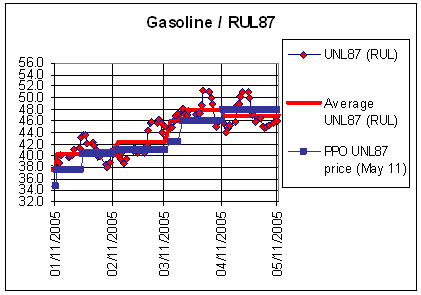
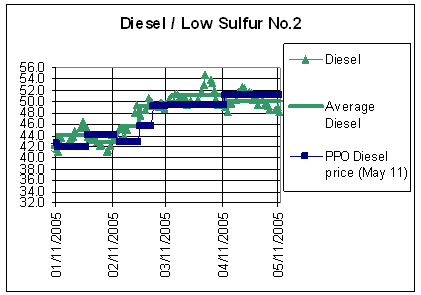
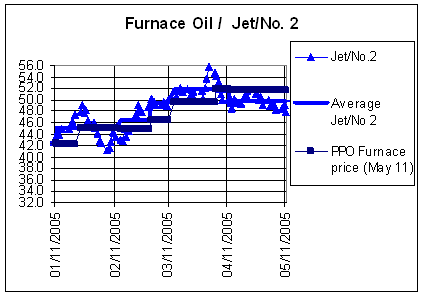
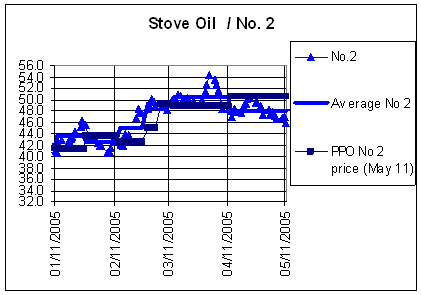
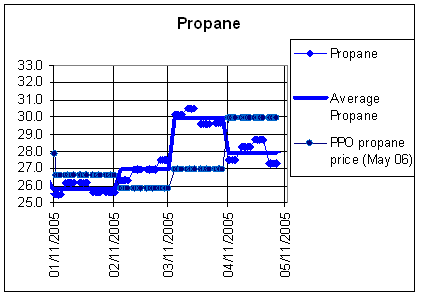
1.Heating Fuels - Residential Propane -
Maximum Tank Wagon Prices - May 15, 2005
2. Automotive Fuels - Maximum Retail
Pump Prices - Effective May 15, 2005
3. Heating Fuels - Maximum Tank Wagon
(or ** Tank Farm) Prices - Effective May 15, 2005
Media contact: Michelle Hicks, Communications, 1-866-489-8800, (709)
489-8837
2005 05 16 1:25 p.m. |









